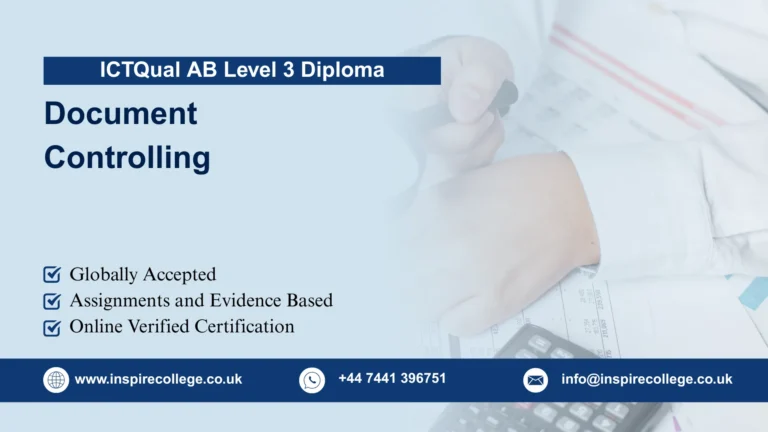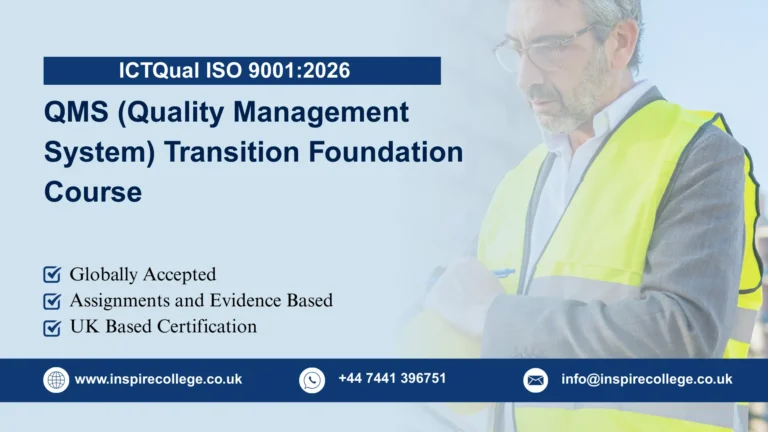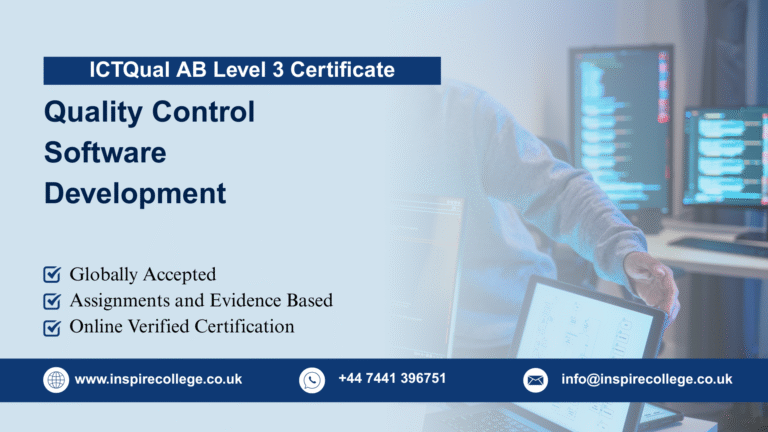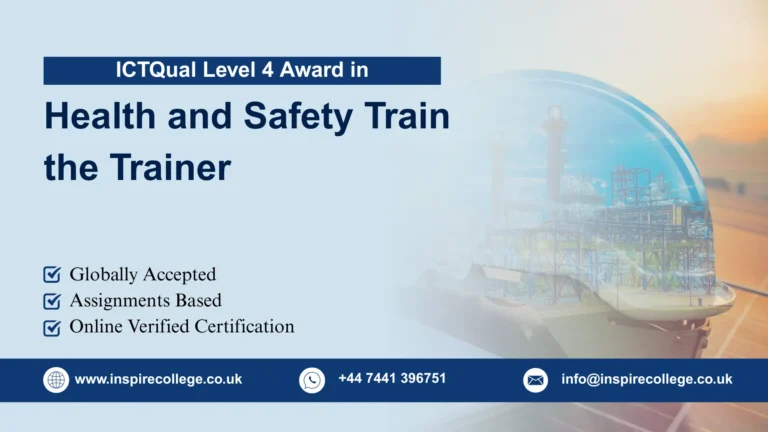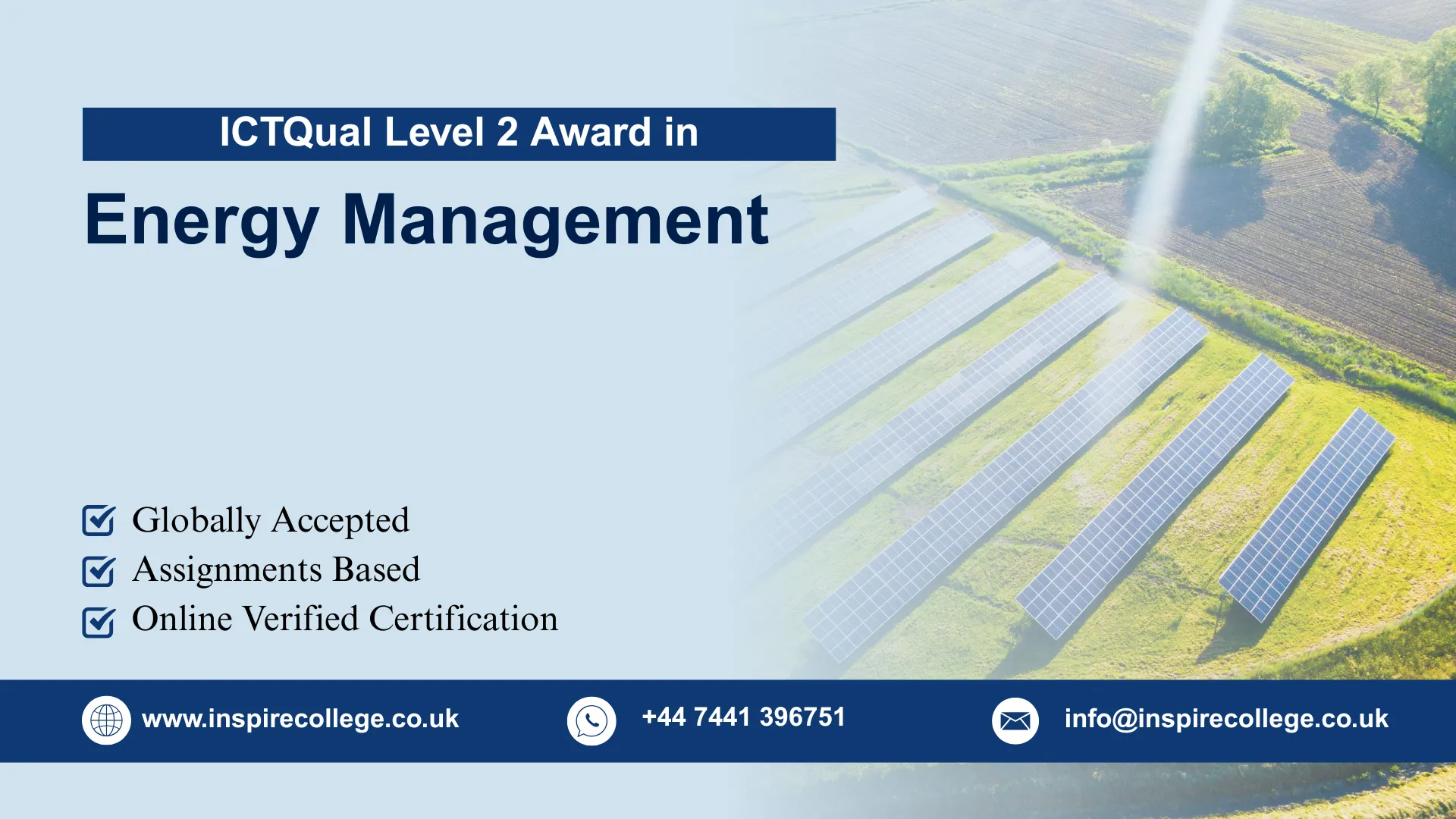
ICTQual Level 2 Award in Energy Management
In today’s evolving global economy, energy efficiency and sustainable resource management are no longer optional—they are essential. Organizations of all sizes are seeking skilled professionals who understand the fundamentals of energy management and can contribute to reducing energy costs and carbon footprints. The ICTQual Level 2 Award in Energy Management is designed to meet this growing demand by equipping learners with the foundational knowledge required to support energy-saving initiatives across sectors.
This entry-level qualification is ideal for individuals who want to take their first step into the energy and sustainability sector, whether to support current responsibilities or begin a new career path.
The ICTQual Level 2 Award in Energy Management is a foundational qualification that introduces learners to the core principles of energy use, energy-saving techniques, and sustainable practices within buildings and businesses. Awarded by ICTQual, a globally recognized awarding body, this course provides essential knowledge for individuals involved in energy-related functions or those looking to support energy efficiency initiatives in their organization.
The ICTQual Level 2 Award in Energy Management is more than just a qualification—it’s a stepping stone toward a meaningful and impactful career in sustainability. Whether you’re looking to support your organization’s energy goals, reduce operational costs, or contribute to environmental protection, this course provides the skills and knowledge to get started.
Ready to begin your journey into energy efficiency? Enrol today and become part of the global shift toward a more sustainable and energy-conscious future.
To enrol in the ICTQual Level 2 Award in Energy Management, applicants are expected to meet the following criteria:
- Minimum Educational Qualification
- A high school diploma or equivalent may be required to ensure participants have a basic academic foundation.
- Language Proficiency
- Proficiency in English (or the language of instruction) is essential to understand course materials and engage in discussions and assessments effectively.
- Basic Computer Literacy
- Familiarity with word processing software, email, and internet browsers is beneficial for accessing course content and completing online assessments, where applicable.
- Relevant Work Experience (Preferred, Not Mandatory)
- While not required, experience in engineering, environmental science, facilities management, or energy-related roles is advantageous and may enhance practical understanding of course concepts.
Mandatory Units
The ICTQual Level 2 Award in Energy Management consists of 11 mandatory units required for completion.
Mandatory Units
- Fundamentals of energy management
- Energy consumption awareness in the workplace
- Reducing energy consumption in the workplace
- Importance of collecting and managing energy data
- Energy consumption in buildings and processes
- How energy use equipment and systems operate
- Importance of energy audits and assessments in the workplace
- Legislative and regulatory requirements covering energy
- Importance of an organisation’s energy strategy, planning and policy
- Role of design, installation and commissioning of energy use equipment and systems
- Use of operational and maintenance controls to operate the energy use equipment and systems efficiently
Here are the learning outcomes for each study unit:
Fundamentals of Energy Management
- Define the concept of energy.
- Identify various forms of energy.
- Define carbon emissions.
- Define energy management.
- Identify the significance of core energy management competencies, encompassing Technical and Operational skills, Energy Assessment and Measurement & Verification techniques, Behavioral Change and Motivation strategies, Regulatory and Legal Compliance, Carbon Management, Strategic Planning, Waste Management, Procurement, Transportation, Water, and ICT.
- Explain the responsibilities and functions of an energy manager.
- Describe the process of energy reporting.
- Explain how energy reporting contributes to the reduction of energy consumption.
Energy Consumption Awareness in the Workplace
- Describe the diverse applications of energy within the workplace.
- Elucidate the variations in energy usage concerning the equipment utilized in the workplace.
- Detail common inefficiencies in energy utilization within working environments.
- Outline methods for measuring energy consumption in the workplace.
- Discuss potential energy-saving practices that can be implemented to decrease energy consumption.
- Expound upon the organizational advantages resulting from reduced energy consumption.
Reducing Energy Consumption in the Workplace
- Identify opportunities for reducing energy consumption through efficiency improvements and behavioral changes.
- Implement energy-saving measures and best practices within the workplace.
- Monitor and evaluate the effectiveness of energy reduction initiatives.
- Collaborate with colleagues and stakeholders to promote a culture of energy conservation.
Importance of Collecting and Managing Energy Data
- Describe sources for obtaining energy data.
- Explain the process of gathering energy data.
- Recognize various types of meters.
- Identify unique identifiers for meters.
- Discuss the components of an energy bill, including meter-specific details.
- Outline different methods for collecting energy data.
Importance of Energy Audits and Assessments in the Workplace
- Outline the structure for conducting energy audits.
- Discuss different methodologies for conducting energy assessments.
- Illustrate the significance of energy audits and assessments in identifying opportunities for enhancing energy efficiency.
Legislative and Regulatory Requirements Covering Energy
- Identify existing legislation aimed at decreasing energy consumption and reducing carbon emissions.
Importance of an Organization’s Energy Strategy, Planning, and Policy:
- Describe the significance of an organization’s energy strategy, planning, and policy.
- Summarize an organization’s energy goals and targets.
- Recognize the advantages of implementing an organization’s energy strategy, planning, and policy.
- Identify worldwide energy trends and their implications for organizational settings.
Energy consumption in buildings and processes:
- Identify various energy sources within a building or process.
- Recognize the methods of energy distribution from the source to users within a building or process, such as through electric cables, pipes, ducts, etc.
- Analyze data to identify the primary energy-consuming equipment and systems.
- Develop a profile illustrating energy consumption within a building or process.
- Identify key mechanisms for energy gain, loss, and potential recovery (e.g., electricity and heat) within a building or process
Energy consumption in buildings and processes:
- Identify diverse energy sources utilized within a building or process.
- Recognize the pathways through which energy is distributed from its source to users within a building or process, including electric cables, pipes, ducts, etc.
- Analyze available data to pinpoint the primary energy-consuming equipment and systems.
- Develop a comprehensive profile depicting energy consumption patterns within a building or process.
- Identify critical mechanisms involved in the acquisition, loss, and potential recovery of energy (both electricity and heat) within a building or process.
Role of design, installation and commissioning of energy use equipment and systems
- Explain the interrelation between the energy consumption of one piece of equipment and its impact on the energy usage of other equipment.
- Highlight the significance of design, installation, and commissioning in influencing the anticipated operational lifespan of energy-consuming equipment and systems.
- Detail the specifications and installation criteria necessary for energy-efficient equipment design.
- Discuss methodologies employed to verify that energy-consuming equipment and systems are installed, tested, and commissioned in accordance with energy-efficient design standards.
Use of operational and maintenance controls to operate the energy use equipment and systems efficiently
- Highlight the significance of operational and maintenance controls in prolonging the intended lifespan of energy-consuming equipment and systems.
- Identify resources for obtaining information regarding operational and maintenance controls for energy-consuming equipment and systems.
- Specify the operational and maintenance criteria necessary for enhancing energy efficiency in equipment and systems, including start-up and shutdown procedures, aligning energy demand with supply, scheduling techniques, operational procedures, maintenance protocols, etc.
ICTQual Level 2 Award in Energy Management
The ICTQual Level 2 Award in Energy Management is designed for individuals seeking to build a foundational understanding of energy efficiency, sustainability, and responsible energy use. Whether you’re beginning your career or supporting energy-related responsibilities in your current role, this course offers essential knowledge for real-world application.
This course is ideal for:
- New Entrants to the Energy or Sustainability Sector
Individuals with little or no prior experience who are looking to explore career opportunities in energy management. - Support Staff in Facilities, Maintenance, or Operations
Employees working in building management, utilities, or maintenance roles who want to contribute to energy-saving efforts. - Environmental and Sustainability Coordinators
Early-career professionals responsible for supporting organizational sustainability goals and energy reporting. - School and College Leavers
Recent graduates or students seeking an entry-level qualification to begin a career in energy or environmental sectors. - Administrative Staff Supporting Energy Projects
Team members assisting with data collection, energy tracking, or compliance documentation. - Small Business Owners or Property Managers
Individuals managing energy consumption in commercial or residential buildings who want to understand and implement cost-saving strategies.
Register Now
FAQs for ICTQual Level 2 Award in Energy Management

